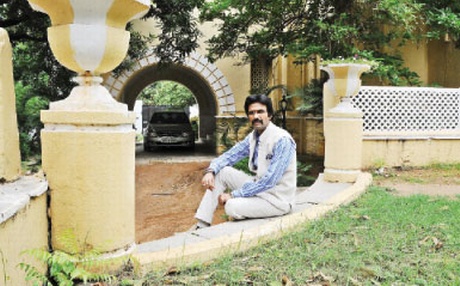
With his neat moustache and a strong voice, award winning playwright-director-actor Mohammad Ali Baig, son of one the most popular theatre personalities, late Qadir Ali Baig, is proud of his rich cultural heritage. Baig, who was a special invitee at Shakespeare’s Globe Theatre in London in July, says he stayed away from Shakespeare and Western playwrights, because that culture is alien to him. “I find it extremely difficult to put on an accent. I love to write in Urdu about my heritage. If you ask me to do a Shakespearean play with the same amount of money and time, I’d refuse. I take pride in my culture. I don’t have to look outside to recreate, be it sets, costumes or even actor’s body language. It gives you a certain sense of fulfillment when you do original work deep-rooted in your own culture,” says Baig, who had earlier presented Indian Tempest, Footsbarn Theatre’s adaptation of Shakespeare’s classic with a desi twist.
His Quli – Dilon ka Shahzaada, has been invited to Footsbarn’s Theatre Festival in France. Written, directed and acted by Baig, the heritage play is based on poet king Quli Qutub Shah. Quli-Dilon ka Shahzaada has a unique structure; a dialogue between Quli and Bhagmati, embellished with live shadow dance, Qawwali on stage, with nazms written by Quli Qutub Shah himself. The Footsbarn Theatre Festival marked a first for the group in terms of the performance venue. Baig has won magical reviews for his latest stage role as Quli. Plays at Footsbarn were performed in a specially-built theatre tent, to an audience much smaller than the sort Baig and his group are used to. “We had never performed in a tent before, so that was a challenge. I consciously conceived and designed the play to make it contemporary. I enjoyed performing to large audiences in the open,” he says adding, “It’s based on Baba’s idiom of theatre and his unforgettable historical pageant Quli Qutub Shah staged at Golconda Fort in 1970.”
Founded in the UK in a barn in Cornwall that’s how the name has come about — owned by the Foot family, the travelling theatre performs the classics of Shakespeare and Moliere with multicultural actors. “The format is interesting. It uses puppeteers, acrobats, singers and clowns and is performed in huge tents and makes theatre accessible to everyone. The troupe travels in trucks and a bus,” says Baig. Despite his success on stage, as a boy growing up in Hyderabad, the young Mohammad Ali had designs on a different future. “I never aspired to become an artist,” he says. “Theatre happened by accident. In 2005, on the occasion of the 20th death anniversary of my late Baba (Qadir Ali Baig), when the Government of Andhra Pradesh and the art fraternity of Hyderabad decided to start and name a theatre foundation in his memory. I felt I should take his legacy forward. For me it’s a tribute to Baba,” adds Baig, who initially ran away from theatre fearing he would not be able to live up to the stature of his father. “In order to revive the theatre, we established the Qadir Ali Baig foundation. It is an annual festival where the best of Indian and international theatre find a platform,” he adds.
His theatre productions featured Anupam Kher, Shabana Azmi, Farooq Shaikh, Kabir Bedi, Suhasini Maniratnam, Vani Ganapathy, Sharon Prabhakar, Arif Zakaria, Rahul Sharma, MS Sathyu, Bharat Sharma, Kaarthik Illaiyaraja and many others.
“I hold two people in very high esteem, Abba (late Qadir Ali Baig) and Habib Tanvir,” says Baig. He explains, “My father blended art and commerce. That’s the blend I try to get in my work. Habib saheb created a language of theatre that speaks of India’s diversity. I met him five years ago in Hyderabad. He had come to watch Charandas Chor. He was aging and looked tired. But his energy and clarity of thought were the same. His thirst was still the same,” says Baig.
So does Baig plan to venture into films? “I enjoy telling a story in 30 seconds that would otherwise take three hours to narrate,” he says. What would he say to aspiring artistes? He says, “Many youngsters come with the impression that theatre is just acting. They go to institutes of popular actors, mostly in the West, with aspirations of learning to act. On return, they pitch for Bollywood. If theatre doesn’t come completely with an obsession and love with it, it’s not for you.”
source: http://www.newindianexpress.com / The New Indian Express / Home> Magazine / by Swati Sharma / September 22nd, 2013